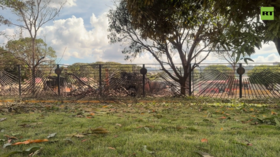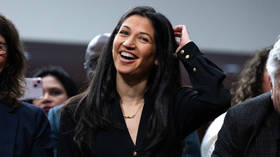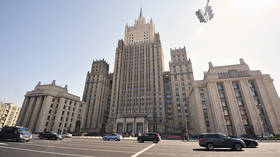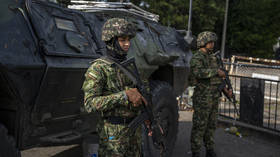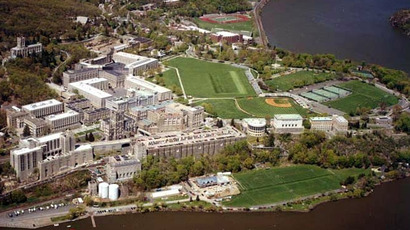‘No expectation of privacy’: Voyeur charges dropped against upskirt photographer at Lincoln Memorial
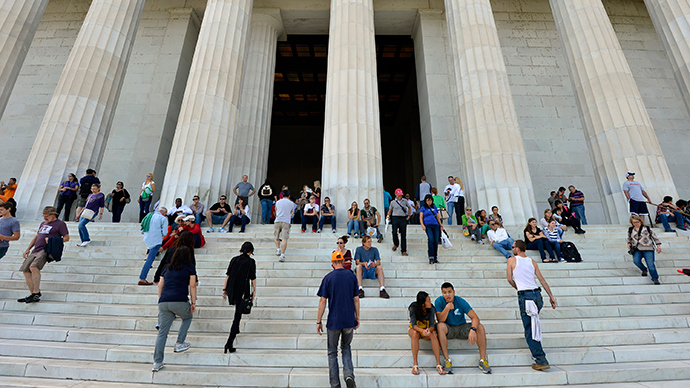
Women sitting on the iconic Lincoln Memorial steps have no expectation of privacy underneath their skirts, a DC judge ruled, dismissing the case against a man accused of taking pictures up women’s skirts without their knowledge.
“This Court finds that no individual clothed and positioned in such a manner in a public area in broad daylight in the presence of countless other individuals could have a reasonable expectation of privacy,” Washington, DC Judge Juliet McKenna wrote in her ruling on a motion to suppress evidence in the case against Christopher Cleveland.
The Virginia man was charged with two counts of attempted voyeurism, attempted tampering with physical evidence and assaulting, resisting or interfering with a police officer in June 2013. US Park Police officers “observed Mr. Cleveland bring his camera to eye level, twist the camera lens, and lower the camera as females walked by,” court documents said. The officers said the suspect used his camera to capture images underneath women’s skirts and dresses as they passed him by. The practice is known as “upskirting.”
When officers approached the man, he walked away and tried to remove the memory card from his camera. When they asked him to drop the camera, he disobeyed and resisted arrest, the Washington Post reported, citing the search warrant.
Officers then reviewed Cleveland’s camera, and found, “numerous shots of women’s crotches and buttocks, according to the warrant. Officers located one of the women, who told them that she had not given anyone consent to photograph her,” the Post said.
But McKenna said she dismissed the case because Cleveland did not go to “extraordinary lengths” to capture images of women’s underwear.
“The images captured were not ‘incidental glimpses’ and in fact were images that were exposed to the public without requiring any extraordinary lengths whatsoever, to view,” she wrote.
Cleveland's lawyer, Jon Norris, asked for a dismissal in the case after McKenna ruled to suppress any statements made by the defendant and any evidence seized at the time of his arrest in August. The attorney had argued that the police “lacked reasonable articulable suspicion to believe that he was engaged in criminal activity and that there was no probable cause to support his arrest,” the suppression order said.
After the case was dropped, Norris said that McKenna “really got the issues in the case,” according to the National Law Journal.
“What’s kind of outrageous about the case is that the police have made a number of arrests for similar conduct which just isn’t illegal. It might be questionable ... but it's not criminal,” Norris said.
Despite the legality of Cleveland’s actions, McKenna condemned his behavior.
“The fact that the Defendant was intentionally photographing publicly exposed areas of women’s clothed and unclothed bodies…is repellent and disturbing,” she wrote.
But McKenna’s decision didn’t sit well with women who frequent the area.
“My interpretation? Women [on this planet] have no expectation of privacy,” a local woman who runs along the National Mall told RT. “The very act of wearing clothes implies an expectation of privacy. And upskirting is absolutely sexual assault.”
A spokeswoman for the court, Leah Gurowitz, released a statement on Thursday afternoon that outlined the difference between Cleveland’s actions and other cases involving upskirting, noting that the Virginia man did not capture “hidden parts of the body” that weren't publicly exposed, the National Law Review wrote.
“There was absolutely no evidence that on the day of his arrest, the defendant engaged in behavior that could be described in any way as ‘upskirting’,” Gurowitz said in the statement.
Nearby, Maryland outlawed the practice in 2006, making it a misdemeanor to surreptitiously photograph or record images of an individual's clothed or naked buttocks, genital area or breasts, the Baltimore Sun reported at the time.
In March, the Supreme Judicial Court of Massachusetts ruled that the state's peeping Toms law did not apply to upskirt photos “because the women who were photographed while riding Boston public transportation were not nude or partially nude.” The Bay State outlawed the practice just days later.
In September, the Texas Court of Criminal Appeals ruled that state’s law against upskirting was a violation of the First Amendment.



